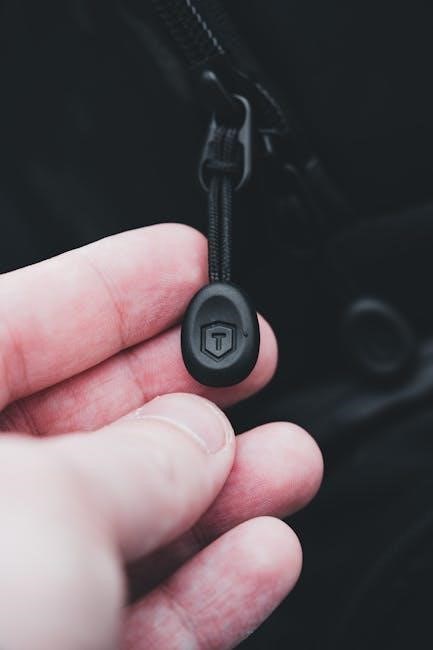The FTC Game Manual Part 1 provides essential rules‚ guidelines‚ and updates for the competition season‚ ensuring teams are well-prepared for events and judging processes.
Overview of the FTC Game Manual
The FTC Game Manual Part 1 is a comprehensive guide outlining rules‚ regulations‚ and procedures for the FIRST Tech Challenge (FTC) competition. It ensures consistency and fairness across all events‚ providing detailed instructions for teams‚ judges‚ and volunteers. The manual is divided into sections covering traditional events‚ judging criteria‚ scoring systems‚ and robot design rules. It also includes guidelines for engineering portfolios and match rules. Regular updates‚ such as the latest revision (Rev 1.2)‚ are released to address rule changes‚ clarify ambiguities‚ and incorporate feedback from previous seasons. Accessibility features‚ like text-based versions for assistive devices and audio recordings‚ ensure all participants can engage with the content. Teams are encouraged to review the manual thoroughly to stay informed and compliant‚ as adherence to its guidelines is crucial for a successful competition experience.

Importance of Staying Updated with the Manual
Importance of Staying Updated with the Manual
Staying updated with the FTC Game Manual Part 1 is crucial for teams to ensure compliance and success in the competition. Regular updates‚ such as Rev 1.2‚ introduce rule changes‚ clarify guidelines‚ and incorporate feedback from previous seasons. Teams must adhere to these updates to avoid penalties and disqualification; The manual’s updates often include critical information about scoring systems‚ judging criteria‚ and robot design rules. By staying informed‚ teams can strategically plan their robot construction and competition strategies. Additionally‚ updates may introduce new resources or tools‚ such as the FTC OnBot Java Programming Tool or REV Robotics Control Hub requirements‚ which can enhance team performance. Failing to stay current may result in missed opportunities or non-compliance‚ emphasizing the importance of regularly reviewing the manual throughout the season.
Structure of the FTC Game Manual
The FTC Game Manual Part 1 is organized into clear sections‚ ensuring easy navigation for teams. It begins with an introduction‚ followed by detailed overviews of traditional events‚ judging processes‚ and scoring systems. The manual also covers engineering portfolio guidelines and robot design rules‚ providing a comprehensive framework for competition preparation. Updates and revisions are highlighted‚ with release dates and version histories to keep teams informed. Accessibility options‚ such as text-based versions for assistive devices and audio recordings‚ are included to ensure inclusivity. Tools and resources‚ like the FTC OnBot Java Programming Tool and REV Robotics Control Hub requirements‚ are outlined to support team operations. Finally‚ archived documentation and additional resources are provided for reference‚ making the manual a complete guide for the competition season.

Content of FTC Game Manual Part 1
FTC Game Manual Part 1 covers traditional events‚ judging criteria‚ scoring systems‚ engineering portfolio guidelines‚ and robot design rules‚ providing a detailed framework for competition preparation and adherence.
Traditional Events in FTC
Traditional events in FTC are cornerstone activities that shape the competition experience. These events include robot games‚ judging sessions‚ and alliance selections‚ each with specific rules and objectives. Teams participate in qualifiers‚ regionals‚ and championships‚ showcasing their robots’ capabilities. The manual outlines match formats‚ scoring metrics‚ and gameplay rules to ensure fairness and clarity. Additionally‚ traditional events emphasize teamwork‚ innovation‚ and sportsmanship‚ fostering a collaborative environment among participants. By adhering to these structured events‚ teams can effectively demonstrate their engineering skills and strategic thinking. The FTC Game Manual Part 1 provides detailed guidelines to help teams navigate these events successfully‚ ensuring a consistent and engaging competition season.
Judging Process and Criteria
The judging process in FTC is designed to evaluate teams based on their robot’s performance‚ engineering design‚ and overall teamwork. Judges assess robots during matches and review engineering portfolios to determine awards. Criteria include robot performance‚ design quality‚ and adherence to rules. Teams must submit their engineering portfolios‚ which document their design journey and innovation. Judges also conduct interviews to understand the team’s strategy and problem-solving approach. The scoring system ensures transparency‚ with points awarded for specific achievements during matches. Feedback from judges helps teams improve for future competitions. The manual outlines detailed criteria to ensure fair and consistent judging across all events. By understanding these guidelines‚ teams can better prepare for evaluations and showcase their skills effectively.
Scoring System and Match Rules
The FTC scoring system is designed to reward teams for their robot’s performance during matches. Points are awarded based on specific tasks completed‚ such as scoring game elements‚ completing challenges‚ or achieving strategic objectives. Each match lasts a set duration‚ typically 2.5 minutes‚ during which teams earn points for their robot’s actions. The scoring system is detailed in Part 1 of the manual‚ ensuring transparency and consistency across all events. Match rules outline penalties for illegal moves‚ such as exceeding time limits or damaging field elements. Teams must adhere to these rules to avoid disqualification. The system emphasizes fairness and sportsmanship‚ ensuring all teams have equal opportunities to showcase their skills. Understanding the scoring system and match rules is crucial for strategic planning and maximizing points during competitions.
Engineering Portfolio and Submission Guidelines
The engineering portfolio is a critical component of FTC competitions‚ showcasing a team’s design process‚ innovation‚ and problem-solving skills. Teams are required to submit a portfolio that documents their robot’s development journey‚ including brainstorming sessions‚ design iterations‚ and final construction. The manual provides detailed guidelines on the portfolio’s structure‚ content‚ and submission formats. It emphasizes the importance of clarity‚ organization‚ and adherence to specified page limits. Submissions must be uploaded digitally through the designated platform‚ with deadlines strictly enforced. The portfolio is evaluated by judges‚ who assess creativity‚ technical depth‚ and teamwork. Properly following the submission guidelines ensures teams are fairly considered for awards and recognition. The portfolio not only highlights technical achievements but also demonstrates the team’s ability to communicate their engineering process effectively.
Robot Design and Construction Rules
The FTC Game Manual Part 1 outlines specific rules for robot design and construction‚ ensuring safety‚ fairness‚ and consistency across all teams. Robots must adhere to size and weight limits‚ and only approved materials and components can be used; The manual prohibits hazardous materials and requires teams to ensure their robots are structurally sound and safe for competition. Teams are also required to comply with rules regarding electrical systems‚ motors‚ and power sources. Additionally‚ the manual specifies guidelines for using cameras and sensors‚ such as USB Video Class (UVC) cameras for robot vision tasks. When using a REV Robotics Control Hub‚ an external webcam is mandatory. Teams must submit design documentation and images for review before competitions. These rules ensure all teams compete on a level playing field while encouraging creativity and innovation within established boundaries.

Updates and Revisions in FTC Game Manual Part 1
The latest revision‚ Rev 1.2‚ was released on 10/18 and includes key updates to rules and guidelines for the current competition season.
Latest Revision (Rev 1.2) and Key Changes
The latest revision‚ Rev 1.2‚ was released on 10/18 and introduces significant updates to the FTC Game Manual Part 1. Key changes include updated rules for robot construction‚ clarification on the use of UVC cameras for robot vision‚ and revised judging criteria. Teams must adhere to these changes to ensure compliance. The revision also includes new guidelines for match scoring and penalties‚ reflecting feedback from previous seasons. Staying updated with the latest version is crucial for a successful competition season. The manual is available on the official FIRST website‚ ensuring accessibility for all participants. These updates aim to enhance fairness‚ clarity‚ and innovation in the competition. Teams are encouraged to review the changes thoroughly to prepare effectively.
- Release Date: 10/18
- Key Updates: Robot construction rules‚ UVC camera usage‚ judging criteria‚ and scoring guidelines.
- Importance: Ensures compliance and prepares teams for the competition season.
Visit the official FIRST website for the latest version.
Release Dates and Version History
The FTC Game Manual Part 1 is updated annually‚ with the latest version‚ Rev 1;2‚ released on 10/18. Previous versions‚ such as the 2013-2014 manual‚ are archived for reference. The manual typically debuts mid-July or early August‚ aligning with the start of the competition season. Each revision reflects rule changes‚ clarifications‚ and improvements based on feedback. Teams should regularly check the official FIRST website for the most current version‚ ensuring they adhere to the latest guidelines. The version history helps track updates‚ making it easier for teams to stay informed and compliant. Accessing past manuals is also possible through the Archived Game Documentation webpage‚ providing a comprehensive record of seasonal adjustments.
- Latest Release: Rev 1.2 (10/18)
- Typical Annual Release: Mid-July or early August
- Archived Versions: Available on the FIRST website
How to Access the Latest Version
Accessing the latest version of the FTC Game Manual Part 1 is straightforward. Visit the official FIRST Tech Challenge website‚ where the manual is prominently featured under the “Game and Season Info” section. Additionally‚ audio recordings of the manual are available on platforms like Anchor and Spotify‚ catering to different accessibility needs. For assistive devices‚ a text-based English version can be provided upon request. Ensure you download or reference the most recent revision‚ as updates often include critical rule changes. Regularly checking the official resources guarantees teams stay informed and compliant with the latest guidelines.

- Primary Source: FIRST Tech Challenge Website
- Audio Versions: Available on Anchor and Spotify

Accessibility and Support
The FTC Game Manual Part 1 provides a text-based English version for assistive devices and audio recordings on Anchor and Spotify for full accessibility support.
Text-Based English Version for Assistive Devices
The FTC Game Manual Part 1 offers a text-based English version specifically designed for use with assistive devices‚ ensuring equal accessibility for all participants. This version provides a clear and unformatted text alternative‚ making it compatible with screen readers and other assistive technologies. It is an essential resource for teams with members who require accommodations‚ allowing everyone to access the manual’s content without barriers; The text-based version is available upon request and is distributed to ensure compliance with accessibility standards. This initiative reflects FTC’s commitment to inclusivity‚ supporting all participants in their preparation for the competition season. By providing this resource‚ FTC ensures that every team member can engage fully with the manual’s guidelines and requirements‚ fostering a level playing field for all.
Audio Recordings of the Manual
Audio recordings of the FTC Game Manual Part 1 are available on platforms like Anchor and Spotify‚ providing an accessible way for teams to engage with the content. These recordings‚ released for the 2022-23 season‚ allow participants to listen to the manual’s guidelines and updates‚ making it easier to digest the information while on the go or during team meetings. The audio format is particularly useful for individuals who prefer auditory learning or have busy schedules. By offering this resource‚ FTC ensures that all teams can stay informed and up-to-date with the latest rules and changes. The recordings align with FTC’s commitment to accessibility and inclusivity‚ helping to level the playing field for all participants. This innovative approach reflects FTC’s dedication to supporting teams in their preparation for the competition season.
Platforms for Accessing the Manual (Anchor‚ Spotify)
The FTC Game Manual Part 1 is accessible through popular platforms like Anchor and Spotify‚ ensuring wide reach and convenience for teams. Audio recordings of the manual‚ specifically for the 2022-23 season‚ are available on these platforms‚ enabling teams to listen to the guidelines and updates while on the go. Anchor and Spotify provide easy access to the content‚ making it ideal for auditory learners or those with busy schedules. This initiative aligns with FTC’s commitment to inclusivity and accessibility‚ ensuring all participants can stay informed. By leveraging these platforms‚ FTC fosters a more equitable environment for teams to prepare for competitions. The availability of the manual on these platforms underscores FTC’s dedication to supporting teams through innovative and accessible resources;

Tools and Resources
FTC provides essential tools like the OnBot Java Programming Tool‚ REV Robotics Control Hub‚ and UVC cameras‚ to support robot development and competition preparation.
FTC OnBot Java Programming Tool
The FTC OnBot Java Programming Tool is an integrated development environment (IDE) designed to simplify robot programming. Built into the FTC Robot Controller App‚ it offers a user-friendly interface for teams to write‚ test‚ and deploy code. Compatible with Android-based controllers‚ this tool supports Java programming for robot operations. It includes features like real-time debugging‚ syntax highlighting‚ and code templates to help teams efficiently develop their robot’s functionality. Regular updates ensure compatibility with the latest FTC regulations and technologies‚ making it an indispensable resource for competitive robotics; By leveraging this tool‚ teams can focus on innovation and performance‚ ensuring their robots meet the high standards of FTC competitions.
REV Robotics Control Hub and Webcam Requirements
The REV Robotics Control Hub is a critical component for FTC teams‚ serving as the central processing unit for robot operations. To ensure compatibility and functionality‚ teams using the Control Hub must utilize an external webcam for vision tasks‚ as the hub does not include a built-in camera. The webcam must meet USB Video Class (UVC) standards to integrate seamlessly with the Control Hub and support robot vision applications. This requirement ensures consistency and reliability across different setups‚ allowing teams to focus on developing advanced vision systems for tasks like object detection and autonomous navigation. Compliance with these specifications is essential for optimal performance in FTC competitions‚ where precise and efficient robot operation is paramount.
USB Video Class (UVC) Cameras for Robot Vision
USB Video Class (UVC) cameras are integral to FTC robot vision systems‚ enabling teams to capture and process visual data. UVC compliance ensures compatibility with the REV Robotics Control Hub‚ allowing seamless integration for tasks like object recognition and autonomous navigation. These cameras support standard video streaming‚ making them ideal for real-time applications. Teams can leverage UVC cameras to enhance robot performance in competitions‚ ensuring precise and efficient operation. Compliance with UVC standards is crucial for optimal functionality and reliability in FTC robot vision tasks.

Archived Documentation
Archived FTC Game Manuals provide historical resources for past seasons‚ allowing teams to review previous rules‚ updates‚ and guidelines for reference and preparation purposes online.
Accessing Past Seasons’ Manuals
Teams can access FTC Game Manuals from previous seasons through the official FIRST resource library. These archived documents are organized by season and provide valuable historical context. They include rules‚ updates‚ and guidelines from past competitions‚ allowing teams to review and learn from earlier game formats. Additionally‚ text-based versions of the manual are available for assistive devices‚ ensuring accessibility for all participants. The archived documentation webpage offers a comprehensive repository of past manuals‚ making it easier for teams to reference prior seasons’ rules and updates. This resource is particularly useful for understanding how the competition has evolved and for preparing strategies based on historical data. By reviewing past manuals‚ teams can gain insights into rule changes and improve their understanding of the game mechanics over time.
Archived Game Documentation Webpage
The FTC provides an archived game documentation webpage where teams can access past seasons’ game manuals‚ rules‚ and updates. This resource is essential for understanding how the competition has evolved and for researching historical game formats. Manuals from previous seasons are organized by year‚ making it easy to track changes in rules and guidelines over time. The webpage also includes text-based versions of the manual for use with assistive devices‚ ensuring accessibility for all participants. Additionally‚ it offers a comprehensive repository of game documentation‚ including traditional events‚ judging criteria‚ and scoring systems from past seasons. Teams can use this archive to gain insights into how rules have been updated and to prepare for current and future competitions effectively. The archived documentation webpage is a valuable tool for teams looking to understand the FTC game manual’s historical context and evolution.

Additional Resources and Links
Explore the official FTC website and resource library for comprehensive guides‚ tools‚ and updates. Visit the game and season information page for detailed documentation.
Official FTC Website and Resource Library
The official FTC website offers a wealth of resources‚ including the latest game manuals‚ season updates‚ and tools for teams. The resource library provides detailed guides for robot design‚ judging criteria‚ and competition rules. Teams can access archived manuals from past seasons‚ ensuring a comprehensive understanding of the game’s evolution. Additionally‚ the website features sections dedicated to engineering portfolios‚ submission guidelines‚ and scoring systems. Regular updates are posted‚ making it a crucial destination for staying informed. The FTC website also links to external tools‚ such as the FTC OnBot Java Programming Tool and REV Robotics Control Hub requirements‚ supporting teams in their technical preparations. By leveraging these resources‚ teams can optimize their strategies and performance throughout the competition season.
FTC Game and Season Information Page

The FTC Game and Season Information Page is a central hub for all competition-related details‚ providing teams with essential resources and updates. Located on the official FTC website‚ this page offers access to the latest versions of the Game Manual Part 1‚ traditional event descriptions‚ and scoring systems. It also includes links to audio recordings of the manual for accessibility‚ available on platforms like Anchor and Spotify. Teams can find information on engineering portfolios‚ submission guidelines‚ and judging criteria. The page is regularly updated with release dates‚ version history‚ and key revisions‚ such as the latest Rev 1.2. Additionally‚ it serves as a gateway to archived documentation‚ allowing teams to review past seasons’ manuals and game rules. This resource is vital for staying informed and ensuring compliance with FTC regulations throughout the competition season.
External Links for Tools and Documentation
External links provide additional resources to support FTC teams in their preparation and participation. The official FTC website offers a wealth of documentation‚ including Game Manual Part 1 and its revisions. Teams can access tools like the FTC OnBot Java Programming Tool‚ integrated into the FTC Robot Controller App. REV Robotics provides detailed specifications for Control Hubs and webcam requirements‚ ensuring compatibility with robot vision tasks using UVC cameras. Audio recordings of the manual are available on Anchor and Spotify‚ enhancing accessibility. Archived manuals from past seasons can be found on the Archived Game Documentation webpage. These external resources collectively empower teams to stay informed‚ up-to-date‚ and compliant with FTC standards throughout the competition season.
Adhering to the FTC Game Manual Part 1 is crucial for a successful competition season‚ ensuring compliance and preparation for challenges ahead.
Importance of Adhering to the Manual
Adhering to the FTC Game Manual Part 1 is paramount to ensure fairness‚ consistency‚ and compliance in the competition. Failure to follow the guidelines can result in penalties‚ disqualification‚ or loss of rankings. The manual outlines clear rules for robot design‚ match conduct‚ and judging criteria‚ ensuring all teams compete on a level playing field. Staying updated with the latest revisions is equally critical‚ as changes can significantly impact gameplay and scoring. By following the manual‚ teams demonstrate their commitment to the spirit of the competition and uphold the integrity of the FTC program; Proper adherence also ensures that teams are fully prepared for judging sessions‚ engineering portfolio evaluations‚ and on-field performances. Ultimately‚ understanding and following the manual is not just a requirement—it’s a key to success in the FTC competition.
Preparing for the Competition Season
Preparing for the FTC competition season involves a thorough review of the Game Manual Part 1 to understand rules‚ scoring systems‚ and judging criteria. Teams should familiarize themselves with traditional events‚ robot design requirements‚ and submission guidelines for engineering portfolios. Early preparation includes testing and refining robot designs‚ ensuring compliance with construction rules‚ and practicing match scenarios. Utilizing resources like the FTC OnBot Java Programming Tool and REV Robotics Control Hub can enhance readiness. Teams must also ensure their robots meet technical specifications‚ such as UVC camera requirements for vision tasks. Practicing gameplay strategies and perfecting alliance coordination is crucial. Additionally‚ teams should register for events early and review deadlines for submissions. By staying organized and focusing on teamwork‚ communication‚ and adaptability‚ teams can maximize their performance. Thorough preparation ensures a competitive edge and aligns with the manual’s guidelines for success.
